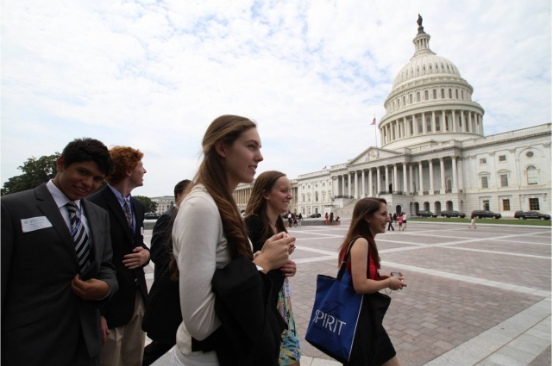A Look at the Year Ahead
Welcome Back Issue

Teen Delegates to Al Neuharth Free Spirit and Journalism Conference in Washington D.C.
September 19, 2016
Each summer we come back to school a little different, externally a bit older and tanner, internally with three more months of life under our belts. It always strikes me that we go back to a place where people remember us as we were before the summer started. We struggle not to revert to the freeze-dried versions of ourselves but to incorporate our new life experience into our school identities and to evolve from there. This school year, many of us are feeling the challenge more acutely, as the summer of 2016 included tragedies like the shooting in Orlando, the bombing in Nice, the slaughter of police officers in Dallas, ongoing violence across the globe, and a US presidential election that has elicited more hatred and divisiveness than many of us have ever witnessed. We simply couldn’t remain unchanged, nor, I would argue, can we afford to be.
Winston Churchill once said, “Never let a good crisis go to waste”, and the horrors of the summer of 2016 provide opportunity to confront the difficult societal issues that have been exposed. Rather than surrender to adversarial discourse, Whittier 2016-17 challenges our community to do better – to use this forum to educate, to inform, to dig deeper. To step away from the notion of sides and to spotlight our collective quest for peace. An informed peace – one that bravely substitutes perspective for opinion, one that supports our shared pursuit of bold, reasoned solutions.
Internally, the writers and editors of Whittier will challenge ourselves to delve deeper into complicated issues through research, polling, and expert interviews. In addition, we encourage students and faculty of Wilmington Friends to join our exploration, as we endeavor to draw upon the richness of our diverse life experiences to broaden our presentation of today’s news.
The urgency cannot be overstated. As tempted as we might be to hide behind the beautiful walls of our school, we learned this summer that no one is immune from the violence borne of our nation’s unresolved crises. I will admit to feeling terrified last July when I took my seat at the United Nations Foundation’s annual GirlUp summit, recognizing that its purpose of securing basic freedoms for girls, like the right to a birth certificate or education, might inspire the rage of someone emboldened by misogynistic diatribes and armed with a freely-obtained firearm.
Similarly, when Jodi Lessner ‘16 reported back after the 2015 Al Neuharth Free Spirit and Journalism Conference, she shared that the national delegates had attended a private taping of Meet the Press, during which host Chuck Todd discussed the issue of gun violence in the wake of the mass shooting in Charlestown, South Carolina. It seems more than a sad coincidence that a year later, my Free Spirit class sat in the exact same room and listened to Chuck Todd discuss gun violence in the wake of the mass shooting in Orlando. While I don’t have an answer, I am also dumbfounded that change has not come about sooner. At seventeen years old, I don’t want to be used to school shootings. I don’t want to be unaffected when a suicide bomber detonates in a café or when a runner is raped and killed in a park or when racial tensions claim yet another victim. It begins to feel impossible, however, to imagine a solution in the midst of so much violence. In addressing the Free Spirit Class of 2016, author Charles C. Haynes cautioned the marginalization of single shooters or dramatic acts of violence. Instead, he encouraged us to view tiny acts of prejudice, off-handed and self-justified hate speech, and subtle demonstrations of superiority and “otherness” as threats to our shared peace, stating, “It’s not one crazy person. It’s a culture. It’s a climate.”
As uncomfortable as it may be, we cannot lament global violence without taking responsibility for its vestiges in our own homes and school. While many people reading this are fortunate enough to live in communities that encourage free speech and integration of ideas and people, we still see glimpses of every day in the cafeteria, on Twitter, and even in the classroom. Every time we hear, “of course you’d say that, you’re *this race, that religion, this social class, that gender* we are witnessing the climate to which Mr. Haynes referred, the climate that defines enemies, the climate that makes people feel “other.” Importantly, our divisiveness belies deep fear and a disregard for the opportunities afforded by our shared humanity. It is the us and them mentality that has put our world into chaos.
Returning to Friends for the 2016-17 school year, my co-editor and I decided that Whittier itself could be a vehicle for the change we seek. Of course we will still feature all the exciting sports, entertainment, and community updates we have all grown to love, but we hope you will also join us in celebrating the type of coverage and discourse necessary to move beyond the violence to which we choose not to become accustomed.































Marilyn Hyte • Oct 6, 2016 at 4:30 pm
Excellent article